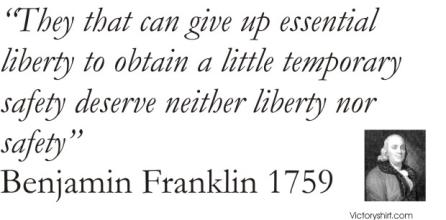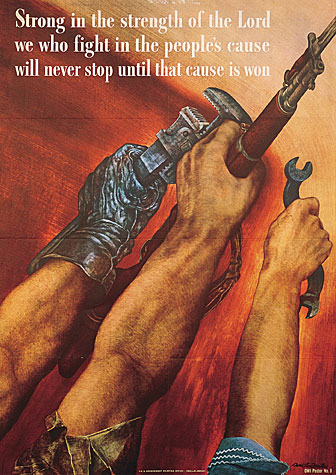TITLE: More on Safety and Freedom in the Extreme
AUTHOR: Eugene Wallingford
DATE: October 19, 2005 8:17 PM
DESC: Hass told us about the danger of valuing safety too highly. But there is danger in valuing freedom too highly, too.
-----
BODY:
 In my entry on
Robert Hass's keynote address,
I discussed the juxtaposition of 'conservative' and
'creative', the tension between the desire to be safe
and the desire to be free, between memory and change.
Hass warned us against the danger inherent in seeking
safety, in preserving memory, to an extreme:
blindness to current reality. But he never
addressed the danger inherent in seeking freedom and
change to the exclusion of all else. I wrote:
In my entry on
Robert Hass's keynote address,
I discussed the juxtaposition of 'conservative' and
'creative', the tension between the desire to be safe
and the desire to be free, between memory and change.
Hass warned us against the danger inherent in seeking
safety, in preserving memory, to an extreme:
blindness to current reality. But he never
addressed the danger inherent in seeking freedom and
change to the exclusion of all else. I wrote:
There is a danger in safety, as it can blind us
to the value of change, can make us fear change.
This was one of the moments in which Hass surrendered
to a cheap political point, but I began to think
about the dangers inherent in the other side of the
equation, freedom. What sort of blindness does
freedom lead us to?
 During a conversation about the talk with
Ryan Dixon,
it hit me. The danger inherent in seeking freedom and
change to an extreme untethered idealism.
Instead of "Ah, the good old days!", we have, "The world
would be great if only...". When we don't show proper
respect to memory and safety, we become blind in a
different way -- to the fact that the world can't be the
way it is in our dreams, that reality precludes somehow
our vision.
That doesn't sound so bad, but people sometimes forget
not to include other people in their ideal view. We
sometimes become so convinced by our own idealism that
we feel a need to project it onto others, regardless of
their own desires. This sort of blindness begins to
look in practice an awful lot like the blindness of
overemphasizing safety and memory.
Of course, when discussing creative habits, we need to
be careful not to censor ourselves prematurely. As we
discussed at
Extravagaria,
most people tend toward one extreme. They need
encouragement to overcome their fears of failure and
inadequacy. But that doesn't mean that we can divorce
ourselves from reality, from human nature, from the
limits of the world. Creativity, as Hass himself told
us, thrives when it bumps into boundaries.
Being creative means balancing our desire for safety
and freedom. Straying too far in either way may work
in the short term, but after too long in either land we
lose something essential to the creative process.
-----
During a conversation about the talk with
Ryan Dixon,
it hit me. The danger inherent in seeking freedom and
change to an extreme untethered idealism.
Instead of "Ah, the good old days!", we have, "The world
would be great if only...". When we don't show proper
respect to memory and safety, we become blind in a
different way -- to the fact that the world can't be the
way it is in our dreams, that reality precludes somehow
our vision.
That doesn't sound so bad, but people sometimes forget
not to include other people in their ideal view. We
sometimes become so convinced by our own idealism that
we feel a need to project it onto others, regardless of
their own desires. This sort of blindness begins to
look in practice an awful lot like the blindness of
overemphasizing safety and memory.
Of course, when discussing creative habits, we need to
be careful not to censor ourselves prematurely. As we
discussed at
Extravagaria,
most people tend toward one extreme. They need
encouragement to overcome their fears of failure and
inadequacy. But that doesn't mean that we can divorce
ourselves from reality, from human nature, from the
limits of the world. Creativity, as Hass himself told
us, thrives when it bumps into boundaries.
Being creative means balancing our desire for safety
and freedom. Straying too far in either way may work
in the short term, but after too long in either land we
lose something essential to the creative process.
-----
 In my entry on
Robert Hass's keynote address,
I discussed the juxtaposition of 'conservative' and
'creative', the tension between the desire to be safe
and the desire to be free, between memory and change.
Hass warned us against the danger inherent in seeking
safety, in preserving memory, to an extreme:
blindness to current reality. But he never
addressed the danger inherent in seeking freedom and
change to the exclusion of all else. I wrote:
In my entry on
Robert Hass's keynote address,
I discussed the juxtaposition of 'conservative' and
'creative', the tension between the desire to be safe
and the desire to be free, between memory and change.
Hass warned us against the danger inherent in seeking
safety, in preserving memory, to an extreme:
blindness to current reality. But he never
addressed the danger inherent in seeking freedom and
change to the exclusion of all else. I wrote:
 During a conversation about the talk with
Ryan Dixon,
it hit me. The danger inherent in seeking freedom and
change to an extreme untethered idealism.
Instead of "Ah, the good old days!", we have, "The world
would be great if only...". When we don't show proper
respect to memory and safety, we become blind in a
different way -- to the fact that the world can't be the
way it is in our dreams, that reality precludes somehow
our vision.
That doesn't sound so bad, but people sometimes forget
not to include other people in their ideal view. We
sometimes become so convinced by our own idealism that
we feel a need to project it onto others, regardless of
their own desires. This sort of blindness begins to
look in practice an awful lot like the blindness of
overemphasizing safety and memory.
Of course, when discussing creative habits, we need to
be careful not to censor ourselves prematurely. As we
discussed at
Extravagaria,
most people tend toward one extreme. They need
encouragement to overcome their fears of failure and
inadequacy. But that doesn't mean that we can divorce
ourselves from reality, from human nature, from the
limits of the world. Creativity, as Hass himself told
us, thrives when it bumps into boundaries.
Being creative means balancing our desire for safety
and freedom. Straying too far in either way may work
in the short term, but after too long in either land we
lose something essential to the creative process.
-----
During a conversation about the talk with
Ryan Dixon,
it hit me. The danger inherent in seeking freedom and
change to an extreme untethered idealism.
Instead of "Ah, the good old days!", we have, "The world
would be great if only...". When we don't show proper
respect to memory and safety, we become blind in a
different way -- to the fact that the world can't be the
way it is in our dreams, that reality precludes somehow
our vision.
That doesn't sound so bad, but people sometimes forget
not to include other people in their ideal view. We
sometimes become so convinced by our own idealism that
we feel a need to project it onto others, regardless of
their own desires. This sort of blindness begins to
look in practice an awful lot like the blindness of
overemphasizing safety and memory.
Of course, when discussing creative habits, we need to
be careful not to censor ourselves prematurely. As we
discussed at
Extravagaria,
most people tend toward one extreme. They need
encouragement to overcome their fears of failure and
inadequacy. But that doesn't mean that we can divorce
ourselves from reality, from human nature, from the
limits of the world. Creativity, as Hass himself told
us, thrives when it bumps into boundaries.
Being creative means balancing our desire for safety
and freedom. Straying too far in either way may work
in the short term, but after too long in either land we
lose something essential to the creative process.
-----